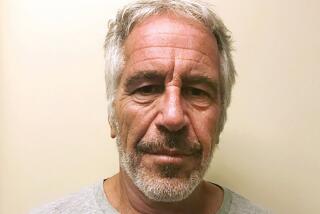Kuwaiti Emir, a U.S. Ally, Dies After Long Illness
Sheik Jabbar al Ahmed al Sabah, the emir of Kuwait who survived an assassination attempt in the 1980s and later escaped Iraqi troops invading his oil-rich Persian Gulf state, died today, state television announced.
The sheik, who was in his late 70s, had been ailing since suffering a brain hemorrhage five years ago.
Sheik Saad al Abdullah al Sabah, a distant cousin chosen by the emir as his heir apparent in 1978, takes over as ruler of the tiny country -- a key U.S. ally in the Middle East.
Because illness has incapacitated Saad, 75, political analysts expect Prime Minister Sabah al Ahmed al Jabbar al Sabah to run the country, a role he has played over the last four years.
The failing health of both Jabbar and Saad had sparked concern at home and abroad over who would rule the nation, which sits on one-tenth of the world’s oil reserves and is a member of the Organization of the Petroleum Exporting Countries.
The government announced a 40-day period of mourning and said government offices would be closed for three days beginning today.
Jabbar was a close friend of the United States even before U.S. forces led the fight to liberate his country from Iraqi invaders in 1991. Kuwait served as the major base 12 years later for the U.S.-led invasion of Iraq.
Kuwait has remained reliant on U.S. forces for defense, and the close alliance is likely to continue under the new leadership. The Sabah family has ruled Kuwait for more than 250 years.
After a Shiite Muslim extremist tried to assassinate Jabbar in a suicide car bombing in 1985, the emir stopped driving his own car to bustling bazaars and cut down on public appearances.
He suffered a brain hemorrhage in 2001 and was treated in London. He had surgery on his leg in the United States in May.
Jabbar was born in 1926 before Kuwait became rich exporting oil and was educated by private tutors in his father’s palace.
Despite his wealth and power, Jabbar avoided ostentation. His palace in Kuwait was described as a spacious but ordinary house, and bread and yogurt often satisfied him at mealtime.
Jabbar became emir on Dec. 31, 1977. The year before taking over, he set up the Fund for Future Generations, a safety net for Kuwaitis when the oil eventually runs out. The fund now has an estimated $60 billion.
Before the Iraqi invasion, the emir and his family presided over an affluent but tightly controlled society.
Jabbar fled to Saudi Arabia, with most of his estimated 70 children and members of the royal family when Saddam Hussein’s armored columns invaded on Aug. 2, 1990, with orders to capture or kill the emir.
The U.S., trying to draw allies into the coalition that drove out Iraq, pressed the Sabahs to institute or return some democratic institutions to the country.
Jabbar decreed in 1999 that women should have the vote and be eligible to run for office. But a conservative parliamentary alliance kept his decree from being put into practice. Six years later, in May 2005, parliament finally approved the legislation.
More to Read
Start your day right
Sign up for Essential California for news, features and recommendations from the L.A. Times and beyond in your inbox six days a week.
You may occasionally receive promotional content from the Los Angeles Times.





